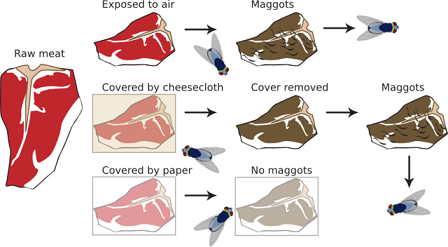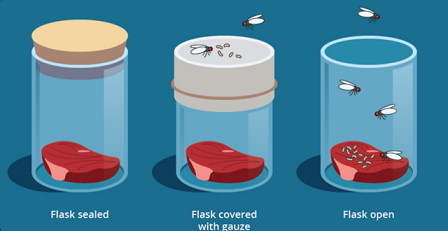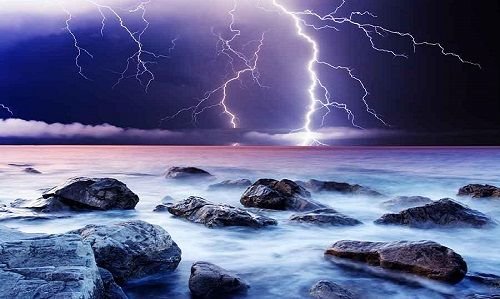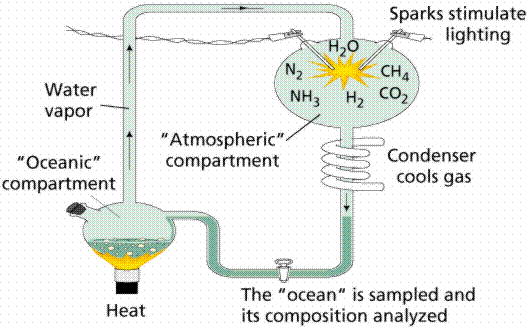
The argument about the origin of life is an ending one and I really do not see it going away any moment soon; not in this generation and few to come. It is a favourite human enterprise to contemplate the beginning of things. Therefore, all cultures have some explanation concerning the origin of life. As man contemplated the origin of life, he also contemplated the origin of the solar system and other heavenly bodies along.

For a long time, scientists believed that life originated rather suddenly; that is, spontaneously. This belief was made possible by the experiment of Aristotle in the fourth century BC. During this period. Aristotle performed an experiment in which he placed pieces of meat in a glass jar and observed it for few days. After the third day, maggots begin to emerge from the meat. Aristotle believed that the maggots appeared spontaneous from the meat and this became one of the strong evidences supporting spontaneous generation of life. The theory gave birth to varieties of beliefs including the belief that snakes could arise spontaneouly from the back hair of horse if the horse stands in a stagnant water, mice could come from decomposing grass and mice could arise from cheese. Knowledge has really transformed human thinking!

The spontaneous generation idea was further fueled by the Dutch merchant Anton van Leewenhoek between 1674 and 1723 when he decribed his observations of seeing animacules in rain water, water in which peppercorn was soaked and scrappings of teeth under his primitive microscope. Perhaps such belief could still be existing today, thanks to Francesco Redi in 1668 who conducted several experiments to show that dead meat do not just give rise to maggots, except that flies laid their eggs on them.
Several cultures and their associated religions believed that organisms were created through the order of a super-natural being. Like a famous person once put it, it is an understandable confusion of nature with technology. Since man makes things, anything he cannot make, he attributes it to a superior being - God. This belief is popularly called creationism.
So, how were the first organisms made? what were they made of? According to popular opinion, organisms are made of water, certain salts and certain organic compounds. The salts are the same as those found in the sea. Organic compounds are carbon containing compounds. Therefore, the salts contain carbon, oxygen, nitrogen and hydrogen atoms. With the establishment of the concept of evolution, every reality became contemplated as the end process of a series of evolutionary events and this reality itself is considered not static for all time.

The hypothesis therefore gained attention that organic molecules and organisms themselves came into being as a result of evolutionary processes and that since organic molecules antedated organisms, their origin must be abiotic. It is generally conceded that the pre-biotic atmosphere contained carbon, nitrogen, oxygen and hydrogen largely in reduced state, that is as CH4 (methane), NH3(ammonia), H2O (water) and H2(hydrogen gas). This simply means there was no free ozygen available then. In this primitive atmosphere, organic materials arose as a result of the concentration and collision of these compounds in the sea. In so doing, life is believed to have evolved in a Dawinian warm little lake or organic soup. The lake is said to be Darwinian because it is believed that the forces of natural selection operated to enhance the multiplication of the fitter or better adapted molecules and the elimination of the less fit ones.
The above hypothesis was popularised by a Soviet Biochemist, Alexander Oparin and various experiments were performed concerning the hypothesis; these experiments all pointed to a general correctness of the hypothesis. It is generally called chemosynthetic theory of origin of life.
Proving the theory
In actual fact, the pictyre of organic soup painted by Oparin is different from the reality as organic molecules occur in very dilute concentrations since rates of reactions leading to the formation of these molecules are expected to be counter-balanced by equally high rate of destruction. Various attempts have been made to explain how these problems might have beenovercome by physical forces in the pre-biotic environment. More importantly, the nature of natural selection is such that rare successful molecules have high selective, and therefore survival advantage.

By early 1950's, experiments had started in the direction of building systems which simulate the primitive environment with a view to testing the hypothesis that under such circumstances, organic molecules can be obtained from reactions involving methane, ammonia, water and hydrogen gas. The experiment to simulate the conditions of primitive atmosphere in other to make a comprehensive study was undetaken by two American scientists, Harold Urey and Stanley Miller. An analysis of the resulting broth from the experiment using paper chromatography showed the presence of amino acids which are the building blocks of proteins. Example of such amino acid include, glycine, alanine and aspartic acid.
Other experiments since the days of Harold and Stanley have advanced the discoveries. Heat and various forms of electromagnetic radiations were applied instead of Miller's electic sparks toprotein-like polymers, nucleic acid polymers, and porphyrin molecules which are important in energy transformations.
So, how did the first organism came into being?
It is in the kind of environment hypothesized in the above experiments that the first living organisms are believed to have evolved. The oldest of such organisms, discovered as fossils, are estimated to be over 3 billion years old and they look like extant bacteria and blue-green algae - prokaryotes. Modern microfossils discovered in the early 1960's are very similar to some modern-day microoganisms found in ammonia-rich environment in Wales which is quite suggestive of primitive environment.
In summary
Where and how life came about has been, is been and will continue to be a subject of debate among scientists and laymen alike. There has been a lot of hypothesis, ranging from spontaneous generation or abiogenesis, creationism and then the tested hypothesis that life arose from an organic soup that was created by the conditions of primitive earth. So far, the presently accepted theory is the chemosynthetic theory of origing of life which is consistent with the theory of evolution.
Thank you for reading.
Being A SteemStem Member
Downvoting a post can decrease pending rewards and make it less visible. Common reasons:
Submit
And I'm now wondering where I got life from... Scientifically.... Good post
Downvoting a post can decrease pending rewards and make it less visible. Common reasons:
Submit
thanks
Downvoting a post can decrease pending rewards and make it less visible. Common reasons:
Submit
I'm still looking for who will convince me enough to believe all these theories. Although I wouldn't spend my life trying to understand something I can't understand. I'll rather live the short while. I have here and contribute the best way I can.
Downvoting a post can decrease pending rewards and make it less visible. Common reasons:
Submit
Nice statement bro....
''I'll rather live the short while. I have here and contribute the best way I can.''
Im loving science the more
Downvoting a post can decrease pending rewards and make it less visible. Common reasons:
Submit
But you would prefer someone else answer the question for you? what if the key to immortality is getting to know where life came from?
Downvoting a post can decrease pending rewards and make it less visible. Common reasons:
Submit
Well, I don't want to live forever.
Downvoting a post can decrease pending rewards and make it less visible. Common reasons:
Submit
Imagine if a snake really could come from the hair on the back of a horse. I don't think we would have as many equestrian lovers as we do now. This really is a very interesting article. I love the evolution of humans and how we think and adapt to our surroundings.
Downvoting a post can decrease pending rewards and make it less visible. Common reasons:
Submit
Evolution is really an interesting phenomenon and the closest answer to the question of origin of life
Downvoting a post can decrease pending rewards and make it less visible. Common reasons:
Submit
There are lots of theories to prove and disprove these ideologies. As you have mentioned, it is definitely a debatable topic as such. I believe human body or the body of any living being is not made of just matter, molecules and atoms/cells etc. There is something definitely beyond that which makes a person unique by character and exist. I'm sure science will never have any answers in the near future to explain this in scientific terms.
Downvoting a post can decrease pending rewards and make it less visible. Common reasons:
Submit
Congratulations @aamin! You have completed some achievement on Steemit and have been rewarded with new badge(s) :
Click on any badge to view your own Board of Honor on SteemitBoard.
For more information about SteemitBoard, click here
If you no longer want to receive notifications, reply to this comment with the word
STOPDownvoting a post can decrease pending rewards and make it less visible. Common reasons:
Submit